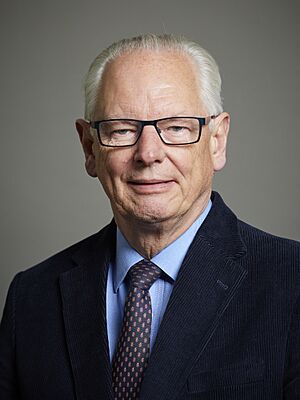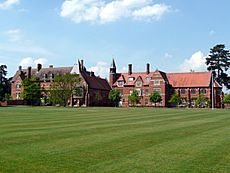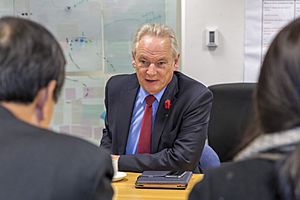Francis Maude facts for kids
Quick facts for kids
The Lord Maude of Horsham
|
|||||||||||||||||||||||||||||||||||||||||||||||||||||||
|---|---|---|---|---|---|---|---|---|---|---|---|---|---|---|---|---|---|---|---|---|---|---|---|---|---|---|---|---|---|---|---|---|---|---|---|---|---|---|---|---|---|---|---|---|---|---|---|---|---|---|---|---|---|---|---|

Official portrait, 2024
|
|||||||||||||||||||||||||||||||||||||||||||||||||||||||
| Minister of State for Trade and Investment | |||||||||||||||||||||||||||||||||||||||||||||||||||||||
| In office 11 May 2015 – 10 February 2016 |
|||||||||||||||||||||||||||||||||||||||||||||||||||||||
| Prime Minister | David Cameron | ||||||||||||||||||||||||||||||||||||||||||||||||||||||
| Preceded by | The Lord Livingston of Parkhead | ||||||||||||||||||||||||||||||||||||||||||||||||||||||
| Succeeded by | The Lord Price | ||||||||||||||||||||||||||||||||||||||||||||||||||||||
| Minister for the Cabinet Office Paymaster General |
|||||||||||||||||||||||||||||||||||||||||||||||||||||||
| In office 12 May 2010 – 11 May 2015 |
|||||||||||||||||||||||||||||||||||||||||||||||||||||||
| Prime Minister | David Cameron | ||||||||||||||||||||||||||||||||||||||||||||||||||||||
| Preceded by | Tessa Jowell | ||||||||||||||||||||||||||||||||||||||||||||||||||||||
| Succeeded by | Matt Hancock | ||||||||||||||||||||||||||||||||||||||||||||||||||||||
| Chairman of the Conservative Party | |||||||||||||||||||||||||||||||||||||||||||||||||||||||
| In office 6 May 2005 – 2 July 2007 |
|||||||||||||||||||||||||||||||||||||||||||||||||||||||
| Leader | |||||||||||||||||||||||||||||||||||||||||||||||||||||||
| Preceded by | |||||||||||||||||||||||||||||||||||||||||||||||||||||||
| Succeeded by | Caroline Spelman | ||||||||||||||||||||||||||||||||||||||||||||||||||||||
|
|||||||||||||||||||||||||||||||||||||||||||||||||||||||
|
|||||||||||||||||||||||||||||||||||||||||||||||||||||||
|
|||||||||||||||||||||||||||||||||||||||||||||||||||||||
| Personal details | |||||||||||||||||||||||||||||||||||||||||||||||||||||||
| Born | 4 July 1953 Abingdon-on-Thames, Berkshire, England |
||||||||||||||||||||||||||||||||||||||||||||||||||||||
| Political party | Conservative | ||||||||||||||||||||||||||||||||||||||||||||||||||||||
| Spouse |
Christina Hadfield
(m. 1984) |
||||||||||||||||||||||||||||||||||||||||||||||||||||||
| Children | 5 | ||||||||||||||||||||||||||||||||||||||||||||||||||||||
| Education | Abingdon School, Oxfordshire |
||||||||||||||||||||||||||||||||||||||||||||||||||||||
| Alma mater | Corpus Christi College, Cambridge University of Law |
||||||||||||||||||||||||||||||||||||||||||||||||||||||
Francis Maude, Baron Maude of Horsham (born 4 July 1953) is a British politician from the Conservative Party. He held important jobs in the government, like Minister for the Cabinet Office and Paymaster General, from 2010 to 2015. He also worked in the Shadow Cabinet when his party was not in power.
Francis Maude was a Member of Parliament (MP) for North Warwickshire from 1983 to 1992. Later, he was an MP for Horsham from 1997 to 2015. After more than 25 years in the House of Commons, he became a life peer in 2015. This means he joined the House of Lords for life. He then served as Minister of State for Trade and Investment from 2015 to 2016.
Contents
Early Life and Education
Francis Maude is the son of Angus Maude, who was also a Conservative politician. Francis spent some of his childhood in Sydney, Australia. This was because his father worked there as an editor for a newspaper.
When his family returned to the UK, Francis went to Abingdon School. He then studied at Corpus Christi College, Cambridge and the College of Law. In 1977, he became a lawyer, which is called being "called to the Bar." He worked as a criminal lawyer. From 1978 to 1984, he was also a member of the Westminster City Council.
Political Career Highlights
Serving in Government (1983–1992)
Francis Maude was first elected as an MP for North Warwickshire in 1983. This was a big win for the Conservative Party. In 1984, he became a special assistant to the Minister for Employment. He then worked as a government whip from 1985 to 1987.
Later, he became the Minister for Corporate and Consumer Affairs. In 1989, he was made Minister of State for Europe. He also helped sign the Maastricht Treaty in 1992. This treaty was important for the future of Europe.
In the 1992 general election, Francis Maude lost his seat as an MP. This meant he had to leave his government jobs. After this, he became a member of the Privy Council. This is a group of important advisors to the King.
Years later, in 2006, Francis Maude said that a law called Section 28 was a "mistake." This law had stopped local councils from promoting homosexuality. He said that looking back, it was "very wrong" and had become a symbol of intolerance.
Working Outside Parliament (1992–1997)
After leaving Parliament in 1992, Francis Maude took on several business roles. He worked in banking as a managing director at Morgan Stanley. He also served as a director for other companies like ASDA and Salomon Brothers.
From 1994 to 1997, he led a government group called the Deregulation Task Force. This group looked for ways to make rules simpler. This experience helped him later when he became a Cabinet Office Minister.
In the Shadow Cabinet (1997–2010)
In the 1997 general election, Francis Maude was elected as an MP again, this time for Horsham. He quickly joined the Conservative front bench, which was now the opposition. He held important roles like Shadow Chancellor of the Exchequer and Shadow Foreign Secretary.
Francis Maude was seen as a "moderniser" within his party. He believed the Conservative Party needed to change to appeal to more people. He helped create a group called Conservatives for Change, or CChange. This group worked to update the party. He also helped start Policy Exchange, a think tank.
After the 2005 election, Francis Maude became Chairman of the Conservative Party. He worked with the new party leader, David Cameron, to reform the party. They focused on choosing more women and people from different backgrounds as candidates for Parliament.
In 2007, he became Shadow Minister for the Cabinet Office. His job was to get the Conservatives ready to take over the government. He made sure they had clear plans and skilled teams. He also supported John McCain in the 2008 U.S. presidential election.
Returning to Government (2010–2016)
In May 2010, Francis Maude was appointed Paymaster General and Minister for the Cabinet Office. He was part of the new government formed by the Conservatives and Liberal Democrats. In these roles, he was in charge of making public services more efficient. He also handled issues related to the Civil Service, government spending, and cyber-security.
Making Government More Efficient
In 2010, Maude created the Efficiency and Reform Group (ERG). This group worked to save money and make government departments more efficient. They did this by stopping wasteful spending and improving how the government bought things. They also reduced losses from fraud and sold unused government buildings.
The ERG claimed to have saved billions of pounds. By 2015, Francis Maude's work had led to over £50 billion in audited savings. These savings came from reducing the size of the Civil Service and reforming pensions. They also saved money by having departments buy goods together.
Reforming the Civil Service
In June 2012, Maude shared his plans for changing the Civil Service. These plans aimed to improve the skills of civil servants and make their performance management better. They also worked on improving IT and flexible working across government departments.
Promoting Transparency
Maude also led the government's efforts to be more open and transparent. This meant publishing more government data online. For example, they published details on government spending over £25,000 and senior staff salaries. Websites like Data.gov.uk now have thousands of datasets.
He also worked with the Open Government Partnership. This helped make the British government one of the most open in the world at that time. This openness led to new services like the Citymapper app.
Creating GOV.UK
Maude was responsible for creating the Government Digital Service. Their goal was to combine many government websites into one main site, gov.uk. This new website won a design award in 2013. Its simple design inspired government websites in other countries.
The government also aimed to move many services online. Maude's office estimated that doing this could save about £1.8 billion each year. This is because online transactions cost much less than phone calls or letters.
Joining the House of Lords
In February 2015, Francis Maude announced he would step down as an MP. After the election, he was made Baron Maude of Horsham in May 2015. This allowed him to join the House of Lords. He then became Minister of State for Trade and Investment. He resigned from this role in February 2016.
Career Outside Parliament (2016–Present)
Since leaving government in 2016, Francis Maude has taken on several new business roles. He has been an advisor for OakNorth Bank, which helps businesses with finance. He also advises Anvest Partners, a real estate company.
His main work now is as co-founder and chairman of Francis Maude Associates (FMA). He runs this consulting firm with his former advisor, Simone Finn. FMA helps governments around the world become more efficient. Their work is based on Maude's experience as Minister for the Cabinet Office.
Personal Life
Francis Maude married Christina Jane Hadfield in 1984. They have five children together. He was also involved with Abingdon School, where he was Chairman of the Governors for eight years.
See also
- List of Old Abingdonians
 | Janet Taylor Pickett |
 | Synthia Saint James |
 | Howardena Pindell |
 | Faith Ringgold |



